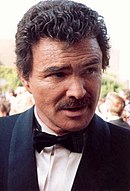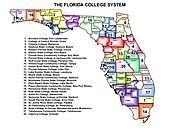Palm Beach State College
 From Wikipedia - Reading time: 11 min
From Wikipedia - Reading time: 11 min
 | |
Former names | Palm Beach Junior College, Palm Beach Community College |
|---|---|
| Motto | Your Pathway To Success |
| Type | Public college |
| Established | 1933 |
Parent institution | Florida College System |
| President | Ava Parker |
Administrative staff | 1,099 |
| Students | 24,223 (all undergraduate)[1] |
| Location | , , United States |
| Campus | Urban |
| Nickname | Panthers |
| Website | www |
Palm Beach State College is a public college in Lake Worth, Florida. It is part of the Florida College System.[2] Palm Beach State College enrolls nearly 25,000 students in over 100 programs of study including bachelor of applied science, associate in arts and associate in science degree programs, and short-term certificates, as well as continuing education and avocational courses. In 2009, the college started its first baccalaureate program, a Bachelor of Applied Science degree in Supervision & Management.
History
[edit]
Palm Beach State College was founded in 1933 as Palm Beach Junior College and was the first public junior college in the state of Florida. The Old Palm Beach Junior College Building is listed on the National Register of Historic Places.
The college's first classes were held at Palm Beach High School in West Palm Beach. County school superintendent Joe Youngblood and Howell Watkins, principal of Palm Beach High School, who became the college's first dean, were instrumental in opening the college. The college's initial goal was to provide additional training to local high school graduates who were unable to find jobs during the Great Depression.
In 1948, Palm Beach Junior College moved to Morrison Field, a deactivated Army Air Force base, which is now Palm Beach International Airport. In 1951, the college relocated to the Lake Park Town Hall. Due to the limited availability of space at the town hall, the college had to lay off faculty and staff and cut enrollment to 200 students. During this period, Palm Beach Junior College was known as "the little orphan college." In 1955, the Palm Beach County Commission gave the college 114 acres (46 ha) in Lake Worth, and the state legislature passed a bill providing over $1,000,000 for construction at this site. The college moved to this location, which remains its main campus, in the fall of 1956.
In 1965, Palm Beach Junior College merged with Roosevelt Junior College, which was established in 1958 under President Britton Sayles to serve African American students. In 1968, control over the college passed from the Palm Beach County school district to a board of trustees. In 1978, the college opened its Belle Glade campus. The Palm Beach Gardens campus opened in 1982. In 1983, the college opened a campus adjacent to Florida Atlantic University in Boca Raton. In 1988, the college's board of trustees changed the college's name to Palm Beach Community College.
The District Board of Trustees approved a resolution in June 2009 stating that the college's name should change in light of offering baccalaureate degrees. On September 8, 2009, the Board approved changing the name to Palm Beach State College. The new name officially took effect on January 12, 2010.
Campus
[edit]Palm Beach State College's main campus is located in Palm Beach County, Florida. In addition to the Lake Worth campus, the largest (114 acre/51 building complex) and longest established campus (1956), the college also serves students at full-service locations in Belle Glade (1978), Palm Beach Gardens (1982), Boca Raton (1983) and Loxahatchee Groves (2017).[3]
Academics
[edit]Palm Beach State College enrolls nearly 25,000 students in over 100 programs of study including bachelor of applied science, associate in arts and associate in science degree programs, and short-term certificates.
Enrollment
[edit]| Students | Florida | U.S. Census | |
|---|---|---|---|
| African American | 26.5% | 16.9% | 13.4% |
| Asian American | 3.5% | 2.9% | 5.8% |
| White | 35.7% | 54.1% | 60.7% |
| Hispanic American | 29.2% | 25.6% | 18.1% |
| Native American | 0.5% | 0.5% | 1.3% |
The college is accredited by the Southern Association of Colleges and Schools Commission on Colleges to award the Bachelor of Science, Bachelor of Applied Science, Associate in Arts, Associate in Science and Associate in Applied Science degrees.
The Palm Beach State College truck technology program was ranked as the best in the United States in 2015.[5]
Athletics
[edit]
The college athletics teams, which are nicknamed the Panthers, compete in the Southern Conference of the Florida State College Activities Association, a body of the National Junior College Athletic Association Region 8. In 2013, the Panther baseball team were runners up at the Alpine Bank Junior College World Series. The Panthers lost 7–3 in the National Championship Game to Central Alabama Community College.
Notable people
[edit]Administrators and faculty
[edit]Historical administrators and faculty of the college include names foundational to the history of education in Palm Beach County and Florida, as evident on buildings throughout the campus and on public schools across the county bearing their names.
In 1933, then-county school superintendent Joe A. Youngblood and then-Palm Beach High School principal Howell L. Watkins founded Palm Beach Junior College with volunteer teachers and 45 students.[6][7][8]
More names of that ilk include the college's first and second presidents, John I. Leonard (from 1936 to 1958) and Harold C. Manor (from 1958 to 1978) respectively, and Britton G. Sayles, president and founder of Roosevelt Junior College (from 1958 to 1965).[9][10][11] And the school's third and fourth presidents, Edward M. Eissey (from 1979 to 1997) and Dennis P. Gallon (from 1997 to 2015).[12][13]
Notable faculty names include Watson B Duncan III of whom it was written: "the man who taught myth was indeed mythological". In addition to inspiring students and seeing the new theater named for him, between 1948 and 1991, Duncan taught English and speech, and was chair of the communications department.[14][15]
Alumni
[edit]Among the most notable alumni of Palm Beach State College are actor Burt Reynolds; Jesper Parnevik, who currently plays on the PGA Tour; soap opera actress Deidre Hall; Yolanda Griffith, an Olympic Gold Medalist and Professional Basketball Player with the WNBA; and James L. Wattenbarger, who was the Architect of the Florida Community College system.




- Ross Baumgarten, professional baseball player[16]
- Dante Bichette, professional baseball player[16]
- Wilson G. Bradshaw, President of Florida Gulf Coast University
- Mark Brownson, professional baseball player[16]
- Crystl Bustos, Olympic gold medalist in softball
- William Calley, convicted war criminal (did not graduate)
- Tony Cruz, professional baseball player[16]
- Paul Dicken, professional baseball player[16]
- Tal Erel, Israel National Baseball Team player
- Gar Finnvold, professional baseball player[16]
- Mark Foley, former U.S. Representative
- Joe Grahe, professional baseball player[16]
- Ken Green, professional golfer
- Yolanda Griffith, Olympic gold medalist and professional basketball player
- Deidre Hall, television actress
- David Manning, professional baseball player[16]
- Monte Markham, television and movie actor
- Andy McGaffigan, professional baseball player[16]
- Bobby Muñoz, professional baseball player[16]
- Randy O'Neal, professional baseball player[16]
- Jesper Parnevik, professional golfer
- Brad Peacock, professional baseball player[16]
- Judge Reinhold, television and movie actor
- Sammis Reyes, Chilean basketball and American football player
- Burt Reynolds, television and movie actor
- Antoan Richardson, professional baseball player and coach[16]
- Lucia St. Clair Robson, historical novelist
- Kevin Siegrist, professional player[16]
- Kim Swan, politician and leader of the opposition party in Bermuda
- Robby Thompson, professional baseball player[16]
- James L. Wattenbarger, architect of the Florida Community College system
- Charles Willeford, writer
- Gareth Williams, television and movie actor
- Jeff Wilpon, former Chief Operating Officer of the New York Mets
See also
[edit]References
[edit]- ^ "College Navigator – Palm Beach State College".
- ^ College Directory
- ^ Locations of Palm Beach State College
- ^ "Palm Beach State – Race and Ethnicity, Credit/Prep Students, Fall 2011". Archived from the original on 2013-02-18.
- ^ Palm Beach State College – Mechanics Programs Rankings
- ^ "New Junior College Will Open Tuesday". The Palm Beach Post. 11 Nov 1933. Retrieved 29 Jun 2021.
- ^ "45 Students Enroll for Junior College". The Palm Beach Post. 15 Nov 1933. Retrieved 29 Jun 2021.
- ^ "Junior College Work Outlined to Civitans". The Palm Beach Post. 28 Nov 1933. Retrieved 1 Jul 2021.
- ^ "Countywide Meet to Honor Dr. Leonard, Junior College". The Palm Beach Post. 20 Apr 1958. Retrieved 29 Jun 2021.
- ^ "PBJC Considers 36 For President's Post". The Palm Beach Post. 20 Jan 1977. Retrieved 29 Jun 2021.
- ^ "Roosevelt Junior College Loses 'Identity'". The Palm Beach Post. 8 Apr 1965. Retrieved 29 Jun 2021.
- ^ "Dr. Eissey's Challenge". The Palm Beach Post. 22 Apr 1977. Retrieved 30 Jun 2021.
- ^ Horine, Don (15 May 1887). "PBCC Chooses Motivator". The Palm Beach Post. Retrieved 30 Jun 2021.
- ^ Keyes, Emilie (29 Aug 1948). "Junior College Campus Striking Example of Plant Conversion". The Palm Beach Post. Retrieved 30 Jun 2021.
- ^ Lomartire, Paul; Horine, Don (22 Feb 1991). "'A Born Teacher'". The Palm Beach Post. Retrieved 30 Jun 2021.
- ^ a b c d e f g h i j k l m n o Palm Beach State Panthers – List of MLB Draftees. Baseball Reference. Retrieved on June 24, 2016.
 KSF
KSF